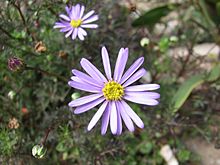- Brachyscome multifida
-
Brachyscome multifida 
Scientific classification Kingdom: Plantae (unranked): Angiosperms (unranked): Eudicots (unranked): Asterids Order: Asterales Family: Asteraceae Genus: Brachyscome Species: B. multifida Binomial name Brachyscome multifida
DC.Synonyms Brachyscome marginata var. multifida (F.Muell.) G.L.Davis[1]
Brachyscome multifida is a perennial herb in the family Asteraceae. Common names include Cut-leaved Daisy, Rocky Daisy, and Hawkesbury Daisy. The species is endemic to Australia.[2]
Contents
Description
This species has an erect, matting growth habit growing to 45 cm in height. The foliage is fine and deeply divided, [2] The flowerheads arise above the foliage on 4 to 40 cm long peduncles. The ray florets are mauve, pink or white and are 7 to 10 mm long.[2][3] The plants main flowerering season is early autumn to mid winter, but the daisy-like flowerheads may appear throughout the year.
Taxonomy
The species was first formally described by Swiss botanist Augustin Pyramus de Candolle, his description published in the 5th volume of Prodromus Systematis Naturalis Regni Vegetabilis in 1836.[1] A collection was made by Allan Cunningham from Peel's Range (now Cocoparra Range) in New South Wales.
Two varieties are recognised:
- B. multifida var dilitata Benth - oblanceolate to cuneate leaf lobes
- B. multifida var multifida- narrow-linear to subulate leaf lobes[2]
Distribution
Brachyscome multifida occurs on dry, shallow or rocky soils in sclerophyll forest or grassland in Victoria, New South Wales and Queensland.[2]
Cultivation
The species and its cultivars are popular in horticulture, and are used for mass plantings, in hanging baskets, in borders and spilling over retaining walls. They can be grown in a wide range of soils and tolerates dry conditions, but will benefit from supplemtary watering. Plants are best situated in a position with full sun, although partial shade is tolerated.Although relatively frost tolerant, foliage may burn.The plants is readily propagated by cuttings which strike readily. Plants may also be propagated by layering or from seed, though germination rate is usually poor.[3]
References
- ^ a b "Brachyscome multifida". Australian Plant Name Index (APNI), IBIS database. Centre for Plant Biodiversity Research, Australian Government, Canberra. http://www.anbg.gov.au/cgi-bin/apni?TAXON_NAME=BRACHYSCOME+multifida. Retrieved 2010-09-13.
- ^ a b c d e "Brachyscome multifida". PlantNET - New South Wales Flora Online. Royal Botanic Gardens & Domain Trust, Sydney Australia. http://plantnet.rbgsyd.nsw.gov.au/cgi-bin/NSWfl.pl?page=nswfl&lvl=sp&name=Brachyscome~multifida. Retrieved 2010-09-13.
- ^ a b "Brachyscome multifida". Growing Australian Plants. Australian National Botanic Gardens. http://www.anbg.gov.au/gnp/interns-2002/brachyscome-multifida.html. Retrieved 2010-09-13.
Categories:- Brachyscome
- Flora of New South Wales
- Flora of Queensland
- Flora of Victoria (Australia)
Wikimedia Foundation. 2010.

